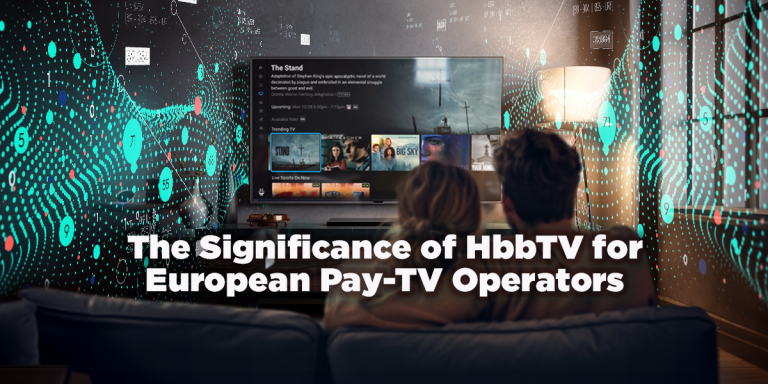In the rapidly evolving landscape of television and digital entertainment, European broadcasters are more and more using Hybrid Broadcast Broadband TV (HbbTV) to stay relevant and competitive. In fact, almost all retail TVs sold in Europe are HbbTV capable, and broadcasters are leveraging this to deliver enhanced content and improved monetisation across their viewer-base.
Nevertheless, a significant repercussion of this development is the potential disadvantage for pay-TV operators. HbbTV, as a technology, establishes a direct connection between the viewer and the broadcaster, thereby undermining the operators’ control over subscribers and redistributing certain opportunities from the operator to the broadcaster.
To counter this, pay-TV operators need to decide on their own HbbTV strategies. They can choose to “embrace and enhance”, or they can choose to continue to ignore HbbTV.
Some of the major reasons to implement HbbTV on operator-controlled devices may be:
- Enhancing Viewer Engagement
One of the primary reasons why European pay-TV operators should embrace HbbTV is its ability to enhance viewer engagement. Traditional linear TV programming can be static and passive, but HbbTV introduces interactivity and personalisation. With HbbTV, viewers can access “Red Button” broadcaster apps to provide additional content, such as related articles, videos, and interactive services, all while watching their favourite shows. This dynamic viewing experience not only keeps viewers engaged but also encourages them to spend more time on the pay-TV platform, leading to higher viewer retention rates and increased revenue opportunities.
- Expanding Content Offering with Catch-up and On Demand Services
HbbTV enables broadcasters to expand their content offerings beyond traditional broadcast channels. By integrating broadcaster-based content, operators can provide a more diverse and comprehensive selection of programming to cater to a broader audience. This includes access to streams that have better quality than the broadcast (UHD, HDR), on-demand content libraries and catch-up TV services. Operators such as Swisscom leverage products like TiVo’s Vewd Core to facilitate the delivery of these services, ensuring the continued relevance of broadcast in the era dominated by streaming giants like Netflix and Amazon Prime. This approach offers viewers a comprehensive, one-stop solution for all their entertainment needs.
- Targeted Advertising
European broadcasters are on the brink of introducing targeted advertising on their own content on retail TVs. This will make TV Advertising more relevant and can greatly increase the value of their inventory. However, the European TV markets are fractioned, with cultural, national and technological borders segregating audiences into smaller and less profitable groups.
To counter this, broadcasters and manufacturers plan to use Automatic Content Recognition (ACR) to run targeted advertisements on TVs connected to the broadcaster via an operator-controlled set-top box. In short, this means having HbbTV Applications running on the retail TV discovering ad-slots and playing out video advertisements while hiding the broadcasted advertisements.
This can be a threat to the operator, but should also be seen as an opportunity. If the Operator and Broadcaster can cooperate on commercial terms to run these advertisements on the Set-Top box, the user experience would improve (only one remote), and the Operator would retain subscriber-control.
- Content owners going direct to consumer
A major trend is that both broadcasters and other content owners wish to go direct to consumer, bypassing operator’s aggregation, and subscriber control. For an Operator, it is vital that consumers see that the Operator has the best total experience, aggregating the complete offering of the broadcasters, and not just a collection of channels. The technical underpinning of this will often be HbbTV, and, if the Operator Controlled Set-Top box does not support this, Operators may see consumers move their focus to retail TVs.
- Get rid of the Set-Top and plan for IP based delivery
Certain operators have taken a comprehensive approach by adopting an HbbTV Operator Application (OpApp) in accordance with the latest HbbTV OpApp 1.2.1 specification. Through this implementation, operators can seamlessly deliver an application over broadband, enabling them to:
- Take over the broadcast (linear) part of the TV user experience.
- Presents the operator’s linear and catalogue content under full operator control.
- Delivers customer and viewing data back to the Operator without letting other parties in.
- The new version of the standard, mixes broadcast and IP delivered channels and prepares for a future where more and more content is served over IP.
- Compliance with Regulatory Requirements
European broadcasting regulations often require pay-TV operators to provide access to public service content and maintain certain quality standards. HbbTV simplifies compliance with these regulations by offering a standardised platform that facilitates the integration of public service content, and accessibility features. Using a product like TiVo’s Vewd Core is a good way for pay-TV operators to meet their legal obligations while maintaining a seamless and user-friendly viewing experience for all viewers.
- Fostering Innovation and Collaboration
The adoption of HbbTV encourages innovation and collaboration within the television industry. It fosters partnerships between pay-TV operators, broadcasters, content creators, application developers, and advertisers. These collaborations lead to the development of innovative interactive applications, content formats, and advertising solutions. Moreover, the HbbTV community continuously works on improving the standard, ensuring that all parties have access to the latest features and capabilities to delight their viewers.
Conclusion
Now is the opportune moment for European pay-TV operators to reassess their HbbTV strategies. Perhaps, it is also an ideal time to contemplate incorporating support for HbbTV, given its capacity to elevate viewer engagement, broaden content options, facilitate targeted advertising, ensure regulatory compliance, and stimulate innovation. As the media landscape undergoes continuous transformation, pay-TV operators must wholeheartedly embrace technologies like HbbTV to stay competitive and fulfil the ever-expanding demands and expectations of their viewers. This proactive approach will not only fortify their standing in the digital entertainment industry but also enable them to consistently deliver high-quality, engaging, and personalised content to their audiences.
To find out more about how TiVo’s Vewd Core is enabling HbbTV across Android, Linux and RDK based devices for operators like Swisscom, please contact us at getconnected.emea@tivo.com


Comments are closed.